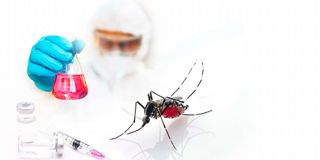New malaria vaccine a game-changer

Malaria vaccine. The research found that a vaccine booster dose one year after children received three doses as their primary vaccination regime maintained high efficacy against malaria.
What you need to know:
- A new study reports on the effectiveness of a malaria booster vaccine
- It has taken more than a century to develop effective vaccines as the malaria parasite, spread by mosquitoes, is spectacularly complex and elusive.
- The research found that a vaccine booster dose one year after children received three doses as their primary vaccination regime maintained high efficacy against malaria.
Experts suggest that a malaria vaccine created by Oxford researchers “is really exciting” and could contribute towards drastically reducing the number of children who die from the infection.
A new study reports on the effectiveness of a malaria booster vaccine, which shows long-lasting high efficacy in African children, meeting the World Health Organisation (WHO)-specified 75 per cent efficacy goal.
Adrian Hill, the director of the Jenner Institute and Lakshmi Mittal and Family Professor of Vaccinology, University of Oxford, said: “I think this is exciting – people have been trying to make malaria vaccines for over a century.
“The first clinical trial was in the 1940s; 140 different malaria vaccines have been into arms to see if the world can make a vaccine that is useful against malaria. We think these are the best data yet.”
It has taken more than a century to develop effective vaccines as the malaria parasite, spread by mosquitoes, is spectacularly complex and elusive.
It is a constantly moving target, shifting forms inside the body, making it hard to immunise against.
Booster dose
The research found that a vaccine booster dose one year after children received three doses as their primary vaccination regime maintained high efficacy against malaria.
The team expects the vaccine to be rolled out next year after trials showed up to 80 per cent protection against the deadly disease.
Read: Step up war on malaria
The scientists added that their vaccine is cheap, and they already have a deal to manufacture more than 100 million doses yearly.
The WHO estimates that malaria caused over 640,000 deaths in 2020, and progress in reducing mortality has stalled in recent years.
Most deaths are among children in Africa, where very high transmission rates are found in many countries.
Researchers reported new findings from their Phase 2b trial following the administration of a booster dose of the candidate malaria vaccine, R21/Matrix-M.
It had previously demonstrated high-level efficacy of 77 per cent against disease over the following 12 months in young west African children in 2021.
The trial was conducted at the Clinical Research Unit of Nanoro (CRUN)/Institut de Recherche en Sciences de la Sante (IRSS), Burkina Faso.
Halidou Tinto, professor of parasitology, regional director of IRSS in Nanoro, and the principal trial investigator, said: “It is fantastic to see such high efficacy again after a single booster dose of vaccine.
“We are currently part of a very large phase III trial aimed at licensing this vaccine for widespread use next year.”
Prof Hill added: “We are delighted to find that a standard four dose immunisation regime can now, for the first time, reach the high efficacy level over two years that has been an aspirational target for malaria vaccines for so many years.”





